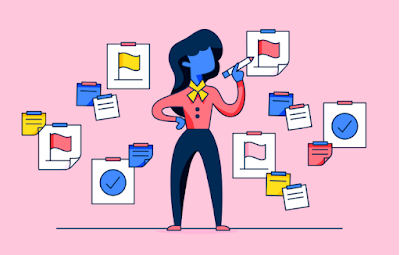It's finally here! The big day has arrived and there's only one thing you can do – prepare like a pro. There are lots of great resources out there to help you get ready for interviews, but many of them are expensive, confusing or just plain hard to understand. That's why I've created this list of 12 Ways To Prepare Like A Pro For Your Interview.
Know about the company
Start by researching the company you're interviewing with.
What does it do? Who are its clients? What are its revenue streams?
The more informed you are, the better prepared you will be
for your interview. Company websites can give you a sense of what to expect on
day one. Check out the company's blog or social media accounts, too.
You'll also want to find out which industries the company
operates in and how those projects are structured. You might want to know if
there's an HR department and whether or not they handle employee recruitment.
Also, ask yourself: Do I want this job? If so, what kind of manager would I
make?
Do some homework about past employees
It’s important to know who your potential new boss is, so
you can put together a good impression. Do some research on their past
employees and learn what they’re like as people. Find out whether they hire
based on personality or qualifications, and if they prefer to work closely with
one person or several people. Do your research before the interview so you can
understand exactly what will happen during the interview.
Prepare nice things to say about your previous job
It's important to prepare nice things to say about your
previous job. Even if you don't have one, it's good practice.
For example, if you worked at a place where the people were
great and the work was challenging and rewarding, you can simply say: "I
loved my time there and wish I could do it again."
If you worked for a big company with lots of perks and benefits,
then you might want to add: "I was very happy working there."
If you worked for a small company that didn't pay much but gave you flexible hours and allowed you to work from home sometimes, then you might want to mention how much autonomy that gave you.
Know who you are interviewing with
You want to be prepared, but you also want to make sure that
you are the best person for the job. This means knowing who you are
interviewing with and what they are looking for in an employee. For example, if
you're interviewing with a small startup that's growing fast, they probably
won't be willing to hire someone who doesn't have experience working in similar
environments. If you're interviewing with a large company that has been around
for years and just decided to expand into new markets, they might not be
interested in hiring someone who has never worked on a project like their own
In addition to knowing what type of company you're
interviewing with, know what position they're hiring for. Are they looking for
someone who can fill an existing position or is it more of a lateral move? What
skills do they need from their next employee? The more specific details about
the position will help ensure that you're qualified for the job and fit well
within their company culture.
Work on some questions yourself
You'll find that the job interview is a great opportunity to
practice your communication skills. You can ask the interviewer questions about
the company, ask them about their work, or even ask them what they do in their
spare time.
Don't be afraid to ask questions!
This will help you get a better sense of what it's like to
work there and how you might fit into their culture. It's also an excellent
opportunity to show that you're interested in the position and willing to learn
more about what it entails.
If you're not sure how much time you should spend preparing
for an interview, here are some tips:
Make sure you have a list of questions prepared ahead of
time so that you can go through them during the interview and make sure
everything is covered.
Handwrite the interviewer a thank you note
Write a handwritten thank you note to the interviewer. A
handwritten note is a great way to let the interviewer know that you're
grateful for their time and considerate of their time. It also shows that you
were paying attention in the interview, which is an important part of being
prepared for an interview.
Write a handwritten thank you note to the interviewer and
leave it on his or her desk. We recommend keeping it simple and short, but make
sure it's clear that you want to express your gratitude for the opportunity.
You can leave it in an envelope or if possible, just hand deliver it to the
person who interviewed you and ask them if they can put it in their inbox
without sticking around too long.
Have a first date outfit picked out
If you're applying for a job and you're going to be talking
about your skills and experience during the interview process, it's important
that you look your best. While there's no rule about what kind of clothes you
should wear, there are some things that you can do to make sure that you look
as professional as possible.
If you have a first date outfit picked out or know where to
go shopping for one, then this is an easy step. But if not, then it might be a
good idea to get some ideas from other people who work in the field that
they're applying for before going out on your own.
It's also important to remember that no matter what kind of
job interview you have coming up, everyone has their own personal style and
preferences when it comes to clothing. If your interviewer likes something
different than what you're wearing, then it could make them feel uncomfortable
or like they don't fit in with the rest of the team.
Having a second outfit ready in case things go wrong is
always nice too!
Look at their website and social media channels
It's important to look at their website and social media
channels. If they have a page on LinkedIn, look at their profile and see if
they have any connections with other people in the industry. Look at their
other social media accounts and see what kind of content they post, as well as
the type of images they use. This will give you an idea about how engaged they
are with their career.
Another way to get a feel for an organization is by looking
at past events that they've had. What were their largest projects? How did they
work with other companies? What were some of the challenges that arose during those
projects? These questions can help you get a better idea of how efficient the organization
is, how well-known it is within your chosen industry, and how capable its
employees are.
Prepare for your interview over a big breakfast that morning
It’s a good idea to have breakfast before your interview.
This will give you a chance to gather your thoughts and settle your stomach, so
you can be ready for the interview. It’s also important to note that many
companies will have an early morning meeting for employees, so if this is the
case, it could be beneficial for you to be there as well.
Even if it’s not an early meeting, don’t skip breakfast!
Have a planned exit strategy from the interview in case it goes badly
If you're not careful, things can go wrong at any time
during a job interview. It's important to have a plan in place for how you'll
handle these situations, so that you can maintain your composure and get back on
track as quickly as possible.
In this post we outline 12 ways to prepare like a pro for
your interview, so that you can keep yourself calm in any situation.
Practice your elevator pitch while looking in the mirror
1. Practice your elevator pitch while looking in the mirror
It's a fact of life that everyone has an elevator pitch, and
you need one if you want to stand out from the crowd and get an interview. The
problem is, most people don't have one.
The first step is to actually define what your elevator
pitch is. In my experience, this means writing it down and practicing it with
friends or family before going in for an interview. It also means practicing
with a mirror because we're so used to talking to ourselves that we often
forget how other people will react when they hear us talk about ourselves.
When you look into a mirror during practice sessions, try
not to say anything too early on because it's easy for you to get distracted by
the mechanics of speaking and forgetting what you're trying to say in the first
place. Instead, focus on making sure that everything sounds natural and makes
sense (and be sure to avoid nerves).
Conclusion
The end goal of all the preparation is to put you in a frame
of mind that leads to the best performance possible. The only thing standing
between you and your goal is likely a single job interview. If you're prepared,
you'll be able to enter your interview with confidence, knowing that your goals
are attainable. So go make it happen!
You also read our others post: 10 Ways To Improve Your Study Habits












0 Comments